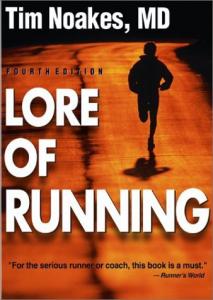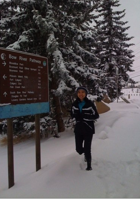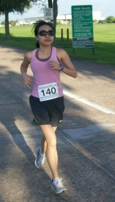
Review of The Lore of Running by Timothy Noakes
Chemical Engineering principles can be applied to many everyday examples, including, yes, running. Timothy Noakes uses energy balance and heat transfer principles in helping us to improve running techniques. Unlike other running books, The Lore of Running is loaded with correlations and research data.
Noakes has a very scientific approach to running. For example, Chapter 4 is dedicated to temperature regulation. Noakes uses heat balance and heat transfer concepts to explain how heat affects a runner's performance as well as how to prevent the body from overheating. While most running advice focuses on ambient temperature, Noakes also accounts for the effect of humidity.

As humidity increases, the ability to lose heat via sweating is decreased. With high humidity, one would need to slow down which reduces heat generation to avoid overheating, especially when sweating is not adequate for cooling the body.
I started running frequently when I was in Calgary where the climate is arid and cold. My body was conditioned to running in a low humidity environment that is optimal for heat transfer.

When I moved back to Houston earlier this year, I found that my body has to recondition itself to handle the heat and humidity, particularly between July through September when relative humidity is often higher than 80%. Combining my heat transfer knowledge along with the help of weather.com, I am able to find a more optimal time of the day where ambient temperature and humidity is lower for my long runs.
This is a great book for any runner who appreciates scientific explanations. This book is also another of demonstration of how versatile chemical engineering principles are. More examples can be seen in the September 2010 edition of the CEP's article: "Engineering a Healthy Body."
Share with us your own experience where chemical engineering knowledge has helped you in your hobbies.
Related articles by Zemanta
- What determines how humid it is? (greenanswers.com)
- Stay Cool! (merrymicrofiberblog.com)
- Sauna - Using the Power of Heat and Humidity for the Benefit of the Body (gogreenstreet.com)



Comments
Wow what a change in those running conditions. Looks like you were enjoying running in the snow. Which is easier weather to adjust to?
This applies in swimming also. If the water is too warm, you can't swim as hard. If the water is too cold, you may not be able to swim effectively since you body is trying to stay warm. Sadly, you can't really layer in a pool for warmth, you just have to depend on the pool staff to keep the temperature at a level that is ideal for a work out or for races (racing pools should be kept slightly colder than workout pools). Additionally, there have been many innovations in speed suits over the past 15 years - all stem from trying to take advantage of the speed of turbulent flow by eliminating laminar flow (water against the suit).
Thanks Elizabeth! You are right on about swimming!
Hi Mike! Personally, I found it a little easier to adjust to colder but less humid weather. I have learned that layers, a hat (or a toque if you are Canadian), gloves are my best friends. It is easy to take layers off. How about you?
I have put this book on my Amazon wishlist- I'd love to have some scientific advise on breaking a PR or two!
Sweet post. I'm going to have to check this book out now. I'm interested in the different processes in your body at night vs. in the morning that might affect your running. I find it MUCH harder to run well (speed and distance) in the morning and I wonder if it's just in my head or if there is some actual physiological difference...
Interestingly, I find it easier to swim in the morning than in the evening. I am not sure if there is something physiologically different, but definately psychologically. When you wake up and aren't entirely thinking straight, of course it sounds reasonable to get in a pool before the sun comes up, but by the evening, I have a myriad of excuses as to why I should not go swimming (too tired, errands to run, etc etc). Eating prior to morning exercise makes a huge difference as well in how you feel and how much energy you have... (I have heard that a mere slice of wheat toast can be a huge energy bost).
Thanks Roxy and Elizabeth for the posts. Roxy - for me, it feels more psychological. I don't tend to run that well on weekdays in the morning (instead I find it nice to run in the evening), but on weekends, I prefer to run in the mornings. Everyone is different in the time the body requires for a proper warm up. @Elizabeth - totally agree with the choice of food prior to rigorous morning exercise. I find that while, I can't have my normal breakfast, having 1 wheat toast or a banana feels just right to provide enough energy and not too much to "slosh" in my stomach while running.
I started running four years ago (I am, yikes 46 now!) when I crossed 200 lbs and the fancy bathroom scale told me to "Just please get off me". It didn't take long to drop 15 lbs. As I too live in Houston, my general rule is to not run over 90F because it takes more energy to stay cool than anything else. Swimming makes a lot more sense from both an heat balance perspective and when you factor in the wear/tear on the body, running exacts a big toll. But if I tell my Dobe let's go swimming, she runs and hides. Running? Drags me to a 4 min mile!
Totally agree here! My general rule is to avoid going outside period when it's over 90 deg F :) It's awesome that your Dobe enjoys going out for a run -it's amazing how much energy the little animals have! I used to run with a group where a few of the runners will bring the Border Collies out to run. They are just run to pace with! Also it's nice to see the running community builds in Houston! Take care and happy running!